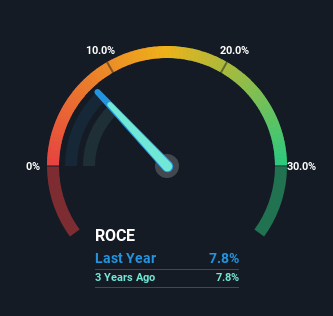- United States
- /
- Semiconductors
- /
- NasdaqGS:CSIQ
Returns On Capital At Canadian Solar (NASDAQ:CSIQ) Paint A Concerning Picture
There are a few key trends to look for if we want to identify the next multi-bagger. In a perfect world, we'd like to see a company investing more capital into its business and ideally the returns earned from that capital are also increasing. Ultimately, this demonstrates that it's a business that is reinvesting profits at increasing rates of return. Although, when we looked at Canadian Solar (NASDAQ:CSIQ), it didn't seem to tick all of these boxes.
Return On Capital Employed (ROCE): What Is It?
If you haven't worked with ROCE before, it measures the 'return' (pre-tax profit) a company generates from capital employed in its business. Analysts use this formula to calculate it for Canadian Solar:
Return on Capital Employed = Earnings Before Interest and Tax (EBIT) ÷ (Total Assets - Current Liabilities)
0.078 = US$470m ÷ (US$12b - US$5.9b) (Based on the trailing twelve months to December 2023).
Therefore, Canadian Solar has an ROCE of 7.8%. On its own, that's a low figure but it's around the 9.7% average generated by the Semiconductor industry.
Check out our latest analysis for Canadian Solar

In the above chart we have measured Canadian Solar's prior ROCE against its prior performance, but the future is arguably more important. If you'd like to see what analysts are forecasting going forward, you should check out our free analyst report for Canadian Solar .
How Are Returns Trending?
We weren't thrilled with the trend because Canadian Solar's ROCE has reduced by 58% over the last five years, while the business employed 210% more capital. However, some of the increase in capital employed could be attributed to the recent capital raising that's been completed prior to their latest reporting period, so keep that in mind when looking at the ROCE decrease. It's unlikely that all of the funds raised have been put to work yet, so as a consequence Canadian Solar might not have received a full period of earnings contribution from it.
On a related note, Canadian Solar has decreased its current liabilities to 49% of total assets. That could partly explain why the ROCE has dropped. What's more, this can reduce some aspects of risk to the business because now the company's suppliers or short-term creditors are funding less of its operations. Since the business is basically funding more of its operations with it's own money, you could argue this has made the business less efficient at generating ROCE. Keep in mind 49% is still pretty high, so those risks are still somewhat prevalent.
What We Can Learn From Canadian Solar's ROCE
Bringing it all together, while we're somewhat encouraged by Canadian Solar's reinvestment in its own business, we're aware that returns are shrinking. And investors appear hesitant that the trends will pick up because the stock has fallen 18% in the last five years. All in all, the inherent trends aren't typical of multi-baggers, so if that's what you're after, we think you might have more luck elsewhere.
One final note, you should learn about the 3 warning signs we've spotted with Canadian Solar (including 2 which are a bit concerning) .
While Canadian Solar may not currently earn the highest returns, we've compiled a list of companies that currently earn more than 25% return on equity. Check out this free list here.
New: AI Stock Screener & Alerts
Our new AI Stock Screener scans the market every day to uncover opportunities.
• Dividend Powerhouses (3%+ Yield)
• Undervalued Small Caps with Insider Buying
• High growth Tech and AI Companies
Or build your own from over 50 metrics.
Have feedback on this article? Concerned about the content? Get in touch with us directly. Alternatively, email editorial-team (at) simplywallst.com.
This article by Simply Wall St is general in nature. We provide commentary based on historical data and analyst forecasts only using an unbiased methodology and our articles are not intended to be financial advice. It does not constitute a recommendation to buy or sell any stock, and does not take account of your objectives, or your financial situation. We aim to bring you long-term focused analysis driven by fundamental data. Note that our analysis may not factor in the latest price-sensitive company announcements or qualitative material. Simply Wall St has no position in any stocks mentioned.
About NasdaqGS:CSIQ
Canadian Solar
Provides solar energy and battery energy storage products and solutions in Asia, the Americas, Europe, and internationally.
Undervalued with reasonable growth potential.
Similar Companies
Market Insights
Community Narratives




